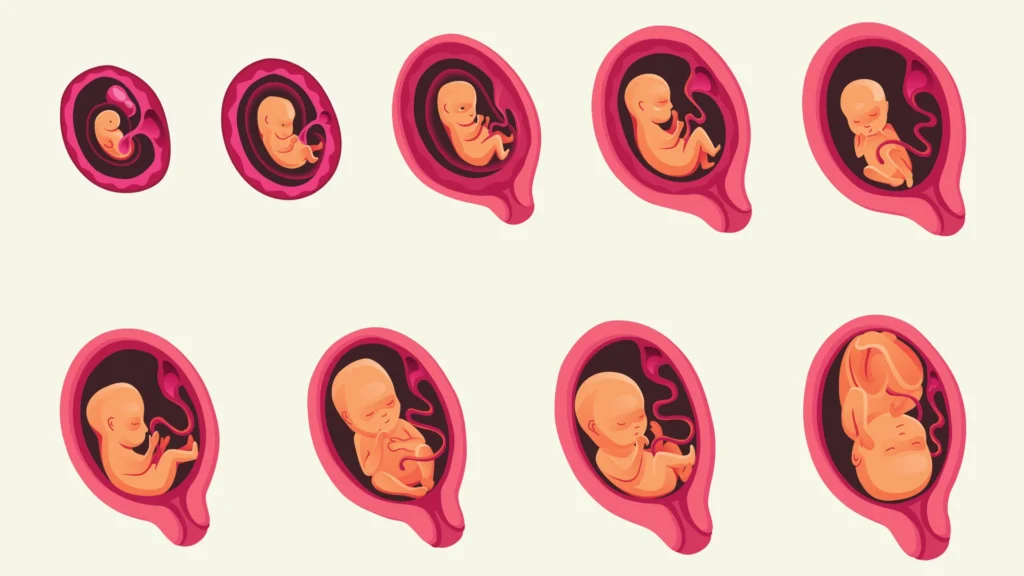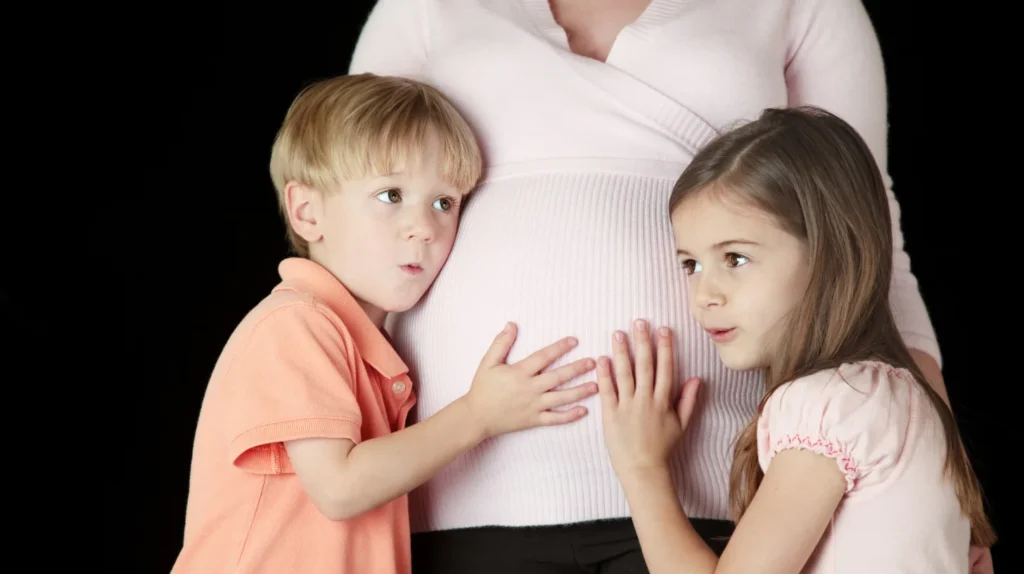The journey of pregnancy is a miraculous one, filled with anticipation and excitement. One of the most fascinating aspects of this journey is the baby development during pregnancy. From the moment of conception to the joyous day of birth, a baby undergoes an incredible journey of development.

This article aims to guide you through this miraculous journey, shedding light on the various stages of fetal development and providing insights into the factors that influence your baby’s growth and well-being.
The Power of Nutrition: Fueling Your Baby’s Growth
The food you eat during pregnancy provides the essential nutrients your baby needs for healthy growth and development. A balanced diet rich in proteins, carbohydrates, healthy fats, vitamins, and minerals supports the formation of your baby’s organs, bones, and tissues. It also helps to maintain your health and prepares your body for breastfeeding. Remember, what you eat, your baby eats too. So, make every bite count!
In addition to a balanced diet, certain nutrients play a critical role in fetal development. For instance, folic acid is essential for the formation of the neural tube, while iron helps to deliver oxygen to your baby’s growing tissues. Therefore, it’s important to include foods rich in these nutrients in your diet or take them as supplements if recommended by your healthcare provider.
The Trimester Timeline: A Detailed Exploration of Your Baby’s Growth

Every pregnancy is a unique journey, marked by the incredible transformation of a tiny fertilized egg into a fully formed baby. This journey is typically divided into three main stages, known as trimesters. Each trimester brings its own set of changes and developments, both for the mother and the baby.
In the first trimester, the foundations of life are laid as the baby’s major organs and systems begin to form. It’s a time of rapid growth and change, filled with excitement and anticipation. The second trimester often brings a welcome relief from early pregnancy symptoms and marks the period when the baby’s movements can be felt. It’s a time when the reality of impending parenthood often starts to sink in. The third trimester is the final stretch of the pregnancy journey, as the baby continues to grow and mature in preparation for birth. It’s a time of eager anticipation, as parents-to-be await the arrival of their little one.
The First Flutters: Experiencing Your Baby’s Initial Movements
One of the most eagerly anticipated milestones in pregnancy is feeling your baby move for the first time. These initial movements, often described as flutters or bubbles, are a tangible sign of the life growing inside you. They usually start between 18 and 25 weeks of pregnancy, but this can vary, especially if this is your first pregnancy.
In the beginning, these movements may be so gentle that they are easy to miss, especially amidst the hustle and bustle of daily life. You might even mistake them for gas or stomach rumblings. However, as your baby grows, these movements will become more distinct. It’s a magical experience that brings the reality of your pregnancy to life and forms the beginning of a bond that will last a lifetime.
Unraveling the Mystery of Baby Kicks: What is Your Baby Trying to Communicate?

As your pregnancy progresses, your baby’s movements evolve from gentle flutters to more pronounced kicks and jabs. These movements are not just a thrilling experience for expectant mothers, but they also provide valuable insights into your baby’s health and well-being. Regular movement is a sign that your baby is active and healthy. However, a significant decrease in your baby’s movements should prompt a call to your healthcare provider, as it could be a sign of distress.
In addition to monitoring the frequency of your baby’s movements, you may also start to notice patterns. Some babies are more active during certain times of the day, while others may respond to specific stimuli such as food or sound. These patterns can provide a fascinating glimpse into your baby’s developing personality and habits. So, pay attention to those kicks and jabs – they are your baby’s way of communicating with you, long before they can speak!
Deciphering Your Baby’s Position in the Womb: Preparing for Birth
As your due date approaches, your baby will move into a position suitable for birth, usually with their head down towards your pelvis. This position is known as the vertex or cephalic position. However, some babies may be in a breech position (bottom first) or transverse position (sideways). Your doctor will monitor your baby’s position and discuss your options for birth, which may include a cesarean section for babies not in the vertex position.
Understanding your baby’s position can also help you prepare for labor and delivery. For instance, certain positions can make labor more comfortable and help your baby descend more easily. Your doctor can provide guidance on positions and movements that can help encourage your baby to move into an optimal position for birth.
The Unforgettable Sound of the First Heartbeat: A Milestone in Your Baby’s Development

Hearing your baby’s heartbeat for the first time is a moment of joy and relief for many parents-to-be. This magical milestone usually occurs around the 6th week of pregnancy using an ultrasound. The baby’s heart beats at a rapid rate of about 110-160 times per minute, almost twice as fast as an adult’s heart.
The sound of your baby’s heartbeat not only provides reassurance of their well-being but also serves as a tangible connection to the life growing inside you. As your pregnancy progresses, you may also have the opportunity to hear your baby’s heartbeat during prenatal check-ups using a Doppler device.
The Marvel of Brain Development: Laying the Foundation for a Lifetime of Learning
Your baby’s brain starts to develop just three weeks after conception and continues to grow throughout pregnancy. By the time your baby is born, their brain will have over 100 billion neurons ready for a lifetime of learning. Factors such as nutrition, stress, and exposure to harmful substances can influence brain development, highlighting the importance of a healthy lifestyle during pregnancy.
In addition to the formation of neurons, the connections between these neurons, known as synapses, also begin to form. These connections are the basis for all of your baby’s future learning, behavior, and functioning. Activities such as listening to music, reading, and talking to your baby can stimulate these connections and support your baby’s brain development.
Physical Growth: Tracking Your Baby’s Size During Pregnancy
Watching your baby grow is one of the most exciting aspects of pregnancy. From a tiny cluster of cells, your baby develops into a fully formed human being, growing in size and complexity with each passing week. Regular prenatal check-ups and ultrasounds allow you to track your baby’s size and development, giving you a fascinating glimpse into the world of your womb.
Your baby’s size can also provide clues about their health and development. For instance, if your baby is smaller or larger than average for their gestational age, it may indicate certain health conditions or complications. Your healthcare provider will monitor your baby’s growth closely and provide guidance and treatment if needed.
The Role of Nutrition in Your Baby’s Development: Eating for Two

Good nutrition is crucial for your baby’s growth and development in the womb. A diet rich in essential nutrients like folic acid, iron, calcium, and protein can help ensure your baby’s healthy development and prepare your body for the demands of pregnancy and breastfeeding.
However, “eating for two” doesn’t mean doubling your calorie intake. Instead, it’s about choosing nutrient-dense foods that provide the vitamins and minerals your baby needs for growth. It’s also important to stay hydrated and avoid potentially harmful substances like alcohol and caffeine.
Sensing the World: How Your Baby’s Senses Develop in the Womb
Even in the womb, your baby is busy exploring their environment through their developing senses. By around 18 weeks, your baby can start to hear sounds, and by 26 weeks, they can respond to light. Your baby can also taste the foods you eat through the amniotic fluid, and they can feel touch, especially in the later stages of pregnancy.
These early sensory experiences can help stimulate your baby’s brain development and prepare them for the world outside the womb. So, go ahead and play some soothing music, shine a light on your belly, or enjoy a spicy meal. Your baby might just be experiencing these along with you!
Ultrasounds: A Window into Your Baby’s World

Ultrasounds provide a unique window into your baby’s world, allowing you to see your baby’s growth and development in real-time. These safe and non-invasive scans use sound waves to create images of your baby in the womb, providing valuable information about your baby’s health, growth, and position.
In addition to monitoring your baby’s development, ultrasounds also allow you to experience special moments like seeing your baby move and hearing their heartbeat. These memorable moments can help strengthen your bond with your baby and make the pregnancy experience even more real.
The Blueprint of Life: Understanding the Role of Genetics in Your Baby’s Development
Your baby’s genetic blueprint is established at the moment of conception when the sperm and egg combine their genetic material. This blueprint determines your baby’s sex, hair color, eye color, and many other characteristics. It also influences your baby’s growth and development in the womb and their risk of certain genetic conditions.
While genetics play a significant role in your baby’s development, they are not the whole story. Factors such as nutrition, environment, and maternal health can also influence your baby’s growth and development, highlighting the complex interplay of nature and nurture in shaping our lives.
The Impact of Stress on Your Baby’s Development: The Importance of a Calm and Happy Pregnancy

Pregnancy can be a time of joy and anticipation, but it can also bring stress and anxiety. Research suggests that high levels of stress during pregnancy can impact your baby’s development and lead to complications like preterm birth and low birth weight. Therefore, it’s important to manage stress effectively during pregnancy for both your health and your baby’s.
Practices like yoga, meditation, and deep breathing can help reduce stress and promote relaxation. It’s also important to seek support from loved ones and healthcare professionals and to take time for self-care. Remember, a happy mother makes a happy baby!
The Joy and Challenges of a Twin Pregnancy
Expecting twins or more can be a thrilling and sometimes overwhelming experience. Twin pregnancies often require more frequent prenatal care and monitoring to ensure the health and well-being of both babies. Mothers of multiples may also experience more intense pregnancy symptoms and have a higher risk of complications.
Despite these challenges, a twin pregnancy can be a wonderful journey filled with double the joy and excitement. With the right care and support, you can navigate this unique experience and look forward to the arrival of your little ones.
Key Takeaways
1. The journey of pregnancy is filled with milestones, from the first flutter of the baby’s movement to the decoding of the baby’s kicks, each providing insights into your baby’s health and development.
2. The position of your baby in the womb can influence the delivery process, and understanding this can help in preparing for childbirth.
3. Nutrition plays a crucial role in fetal growth, emphasizing the importance of a balanced diet during pregnancy.
4. Ultrasounds are a valuable tool in tracking your baby’s progress and development throughout pregnancy.
5. Stress during pregnancy can impact your baby’s development, highlighting the importance of mindfulness and stress management for expectant mothers.
Final Thoughts
The journey of pregnancy is a miraculous one, filled with moments of joy, anticipation, and wonder. From the first flutters of movement to the decoding of the baby’s kicks, every stage brings new insights into your baby’s development. Understanding these milestones, along with the importance of nutrition, the role of genetics, and the impact of maternal stress, can help you navigate this journey with confidence and joy. Whether you’re expecting one baby or more, each pregnancy is a unique and beautiful journey of growth and discovery.
Frequently Asked Questions (FAQs)
When can I feel my baby move during pregnancy?
Most mothers start to feel their baby’s movements between 18 to 25 weeks of pregnancy. These initial movements may feel like flutters or bubbles.
How does maternal nutrition affect fetal growth?
Maternal nutrition plays a crucial role in fetal growth. A balanced diet rich in essential nutrients supports the baby’s development and contributes to a healthy pregnancy.
What is the importance of ultrasounds during pregnancy?
Ultrasounds are important for tracking your baby’s progress. They provide valuable information about the baby’s size, position, and overall health, and can also detect any potential complications.
How does maternal stress impact a baby’s development?
Maternal stress can potentially impact the baby’s development. Chronic high levels of stress may affect the baby’s brain development and increase the risk of preterm birth.





